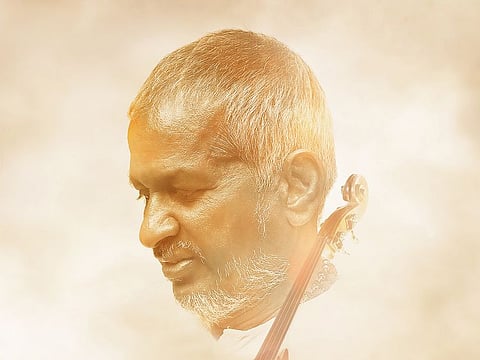Ilaiyaraaja’s Symphony No 1 ‘Valiant’ stuns Dubai fans with grand debut
A standing ovation greets the Maestro as he brings his symphonic masterpiece to Dubai

Dubai: Dubai Opera turned into a temple of music on Saturday evening as Ilaiyaraaja, the Maestro himself, took the stage to a thunderous standing ovation. The applause lasted a full two minutes, echoing with chants of “Thalaivaa” and “Raaja, Rajathi Raaja engal Raaja.” It was more than a concert, it felt like a homecoming for generations of fans who grew up to his melodies.
This year marks Ilaiyaraaja’s 50th anniversary in the music industry, and there couldn’t have been a more fitting celebration than this. Supported by the UAE Philharmonic Orchestra and sponsored by Gulf News, the event brought to life Symphony No. 1 – Valiant, India’s first full-scale Western classical symphony, a project that has taken on mythical status among his fans. For those who remember his first announcement of a symphony in the 1990s that never saw release, this performance was long-awaited closure.
When Ilaiyaraaja announced in May 2024 that he had composed a full symphony in just 35 days, social media lit up. His followers, spanning continents, knew what that meant, that the legend was back, experimenting, pushing boundaries, and blending East and West the way only he can. And on this Dubai night, that promise was fulfilled.
Symphony No. 1 – Valiant
The evening began with the orchestra’s rendition of Valiant, a sweeping, intricate work that carried his signature blend of Carnatic precision and Western harmony. The transitions were lush, the arrangements cinematic, and every section seemed to tell its own story. For many in the audience, this was a connection between nostalgia and newness, the past and the present.
A medley of his greatest hits followed, Kanne Kalaimaane, Poove Sempoove, and Raaja, Rajathi Raaja engal Raaja, sending the audience into rapture. And when the Maestro himself sang Idhayam Poguthe from Puthiya Vaarpugal (1979), it was pure magic. Backed by the full orchestra, his voice carried the same warmth that had once filled cinema halls and transistor radios alike.
Ilaiyaraaja’s relationship with Western classical music is not new. His film scores in the 1980s quietly redefined what Tamil cinema music could sound like. His orchestral flourishes and background scores elevated entire narratives, teaching audiences, perhaps unconsciously, to listen differently. He made listeners aware of silence, of mood, of movement. In doing so, he changed the very grammar of Indian film music.
Even decades later, that influence endures. His compositions have outlived trends, his melodies have transcended generations. On streaming platforms and radio shows, his songs resurface with the same freshness, finding new admirers among younger listeners, like myself, who discover the depth behind every note. His music, after all, has always been about emotion, a third language that needs no translation.
As the final notes faded and the lights dimmed, the audience stayed standing for a moment longer. It felt less like the end of a concert and more like an acknowledgement of Ilaiyaraaja’s lasting presence, a musician whose work continues to resonate after five decades.
Sign up for the Daily Briefing
Get the latest news and updates straight to your inbox



